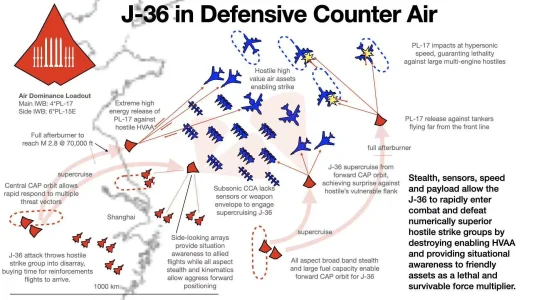You are using an out of date browser. It may not display this or other websites correctly.
You should upgrade or use an alternative browser.
You should upgrade or use an alternative browser.
China military and weapon development (3 Viewers)
- Thread starter rockdog
- Start date
More options
Who Replied?- Joined
- Jul 3, 2024
- Messages
- 1,668
- Likes
- 2,266
Do you understand what is war?
It seems you have no idea what is war, but I will tell you something, I do not want war, but I am realistic, the potencial WWIII is every year going closer and closer and if you think J-20 will not be shot down, you are wrong, if there is a WWIII is very likely we will not survive even if there are survivors, so tell me wise 40 year old man, do you love your children?
Do you want them to live through hell?
I lived Fukushima close, I know at least the basic of what is radioactivity.
But I also I know human nature, Humans we do not learn without tragedies and it seems humans will not stop the arms races unless a big tragedy happens, and it seems you have no Idea what is Hiroshima, If a limited nuclear war happens, I know the war will have lots of bacteriological weapons to reduce nuclear weapons, be my guest and try to think if you love your relatives, children,wife etc etc etc....if you want them to live through that hell....be my guest dream China will replace the USA, I will not say more to you since your spiritual level is low and you will not understand......perhaps one day you realize your nation is just a tool, but sadly you can not comprehend due to your spiritual level.
Last edited:
- Joined
- Jul 3, 2024
- Messages
- 1,668
- Likes
- 2,266
you really love your children I see, you want all the kids go through hell including the Indian Children through Chinese ICBMs specially now China is building damns to reduce the water to India you hypocrite
- Joined
- Jul 3, 2024
- Messages
- 1,668
- Likes
- 2,266
Nuclear winter is a fact, cancers due to radioactivity is a fact, the only reality I accept is in a limited nuclear war even if there are survivors it will take decades for earth to recover, the possibility for average people to survive is low.
Consider a population of 9 billion people 7% of that population will likely survive after a war that kills 1/3 of that population, and 1/2 killed by diseases, lack of infrastructure for hospitals and food production.
The likelihood I will survive that is very low, the likelihood if I survive I will suffer a lot due to relatives lost is very very high, add hunger and disease.
Millions of new born will have deformations and water sources and food sources will be polluted, be my guest, I know whaat is WWIII and I know suffering will be everywhere.
- Joined
- Jul 3, 2024
- Messages
- 1,668
- Likes
- 2,266
Targeting Russians But Safe for Americans': What Bioweapons is the Pentagon Developing?
The US is conducting military biological research aimed at discovering new harmful bacteria and viruses tailored to infect certain races, nationalities and even residents of specific regions, Igor Korotchenko, military analyst and editor-in-chief of "National Defense" magazine told Sputnik.
The Russian Federal Security Service (FSB) disclosed on December 27 that convicted US spy Eugene Spector had gathered and transmitted biotech data to the Pentagon to aid in creating a high-speed system for genetically screening Russians.
The Pentagon's apparent goal is to develop a bioweapon that would affect Russians but remain harmless to Westerners, Korotchenko said. To that end, the US needs to collect bio-material and genetic samples from various ethnic groups living in Russia.
"[Spector] aided the Pentagon’s military biological branches in collecting and transferring relevant samples with the aim of identifying potential vulnerabilities in the genetic code of certain categories of the Russian population," Korotchenko explained.
The Russian counter-intelligence services are aware of and actively preventing the Pentagon's bio-research activities within Russia, the expert noted.
Lieutenant General Igor Kirillov, head of the Russian Armed Forces Radiological, Chemical and Biological Defense Troops, had previously exposed the Pentagon's sophisticated bio-weapon program operating in Ukraine.
In August, Kirillov revealed that prior to 2022, the US had obtained up to 16,000 biological samples from Ukraine with the aim of developing viruses and bacteria dangerous to ethnic Ukrainians and Russians.
General Kirillov was assassinated in a bombing on December 17. Russian investigators stated that the terror attack was carried out on orders from Ukrainian special services.

'Targeting Russians But Safe for Americans': What Bioweapons is the Pentagon Developing?
The US is conducting military biological research aimed at discovering new harmful bacteria and viruses tailored to infect certain races, nationalities and even residents of specific regions, Igor Korotchenko, military analyst and editor-in-chief of "National Defense" magazine told Sputnik.
- Joined
- Jul 1, 2024
- Messages
- 1,703
- Likes
- 6,455
Targeting Russians But Safe for Americans': What Bioweapons is the Pentagon Developing?
The US is conducting military biological research aimed at discovering new harmful bacteria and viruses tailored to infect certain races, nationalities and even residents of specific regions, Igor Korotchenko, military analyst and editor-in-chief of "National Defense" magazine told Sputnik.
The Russian Federal Security Service (FSB) disclosed on December 27 that convicted US spy Eugene Spector had gathered and transmitted biotech data to the Pentagon to aid in creating a high-speed system for genetically screening Russians.
The Pentagon's apparent goal is to develop a bioweapon that would affect Russians but remain harmless to Westerners, Korotchenko said. To that end, the US needs to collect bio-material and genetic samples from various ethnic groups living in Russia.
"[Spector] aided the Pentagon’s military biological branches in collecting and transferring relevant samples with the aim of identifying potential vulnerabilities in the genetic code of certain categories of the Russian population," Korotchenko explained.
The Russian counter-intelligence services are aware of and actively preventing the Pentagon's bio-research activities within Russia, the expert noted.
Lieutenant General Igor Kirillov, head of the Russian Armed Forces Radiological, Chemical and Biological Defense Troops, had previously exposed the Pentagon's sophisticated bio-weapon program operating in Ukraine.
In August, Kirillov revealed that prior to 2022, the US had obtained up to 16,000 biological samples from Ukraine with the aim of developing viruses and bacteria dangerous to ethnic Ukrainians and Russians.
General Kirillov was assassinated in a bombing on December 17. Russian investigators stated that the terror attack was carried out on orders from Ukrainian special services.

'Targeting Russians But Safe for Americans': What Bioweapons is the Pentagon Developing?
The US is conducting military biological research aimed at discovering new harmful bacteria and viruses tailored to infect certain races, nationalities and even residents of specific regions, Igor Korotchenko, military analyst and editor-in-chief of "National Defense" magazine told Sputnik.sputnikglobe.com
Scary to think about it.
- Joined
- Jul 3, 2024
- Messages
- 1,668
- Likes
- 2,266
genetic bioweapons, targeting certain ethnic groups, they are scary because they are real evilScary to think about it.
China rolls out world’s first military-proof 5G that can connect 10,000 army robots

China rolls out world’s first military-proof 5G that can connect 10,000 robots
A mobile communications system that can move through complex terrains has been developed by Chinese scientists.
- Joined
- Jul 3, 2024
- Messages
- 119
- Likes
- 441
- Joined
- Jul 15, 2024
- Messages
- 240
- Likes
- 1,251
Can someone humour me this. @rockdog @Ayan Barat @Bleh
Is BRE8 a (the one in the middle) 2 stage MLRS rocket (I am seeing conflicting images of the said rocket with different configurations)
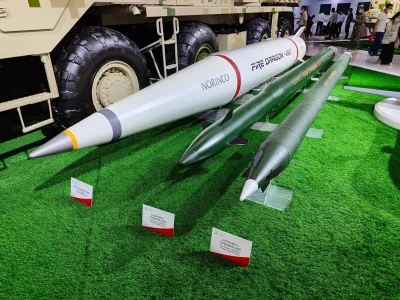
While you are at it can you also mention the dimensions of the following missiles (I'd assume that length is similar to Smerch rocket at 7.6m, but happy to be corrected)
BRC 3
BRE 3 (FD 140A)
BRE 6 (FD 220)
BRE 8 (FD 280)
King Dragon 300
Fire Dragon 480
Is BRE8 a (the one in the middle) 2 stage MLRS rocket (I am seeing conflicting images of the said rocket with different configurations)

While you are at it can you also mention the dimensions of the following missiles (I'd assume that length is similar to Smerch rocket at 7.6m, but happy to be corrected)
BRC 3
BRE 3 (FD 140A)
BRE 6 (FD 220)
BRE 8 (FD 280)
King Dragon 300
Fire Dragon 480
- Joined
- Jul 2, 2024
- Messages
- 1,414
- Likes
- 9,108
• So first, why the chances of it being a two-stage rocket is bit low in my opinion.Is BRE8 a (the one in the middle) 2 stage MLRS rocket (I am seeing conflicting images of the said rocket with different configurations)
If a rod of uniform cross section and density is dropped from above then there's a strong probability that instead of falling straight it'll start to tumble, which is absolutely undesirable for munitions where you want them to hit nose first. So to prevent roll-pitch-yaw which ultimately contribute to tumbling you start adding stabilization methods like fins, hollow tail assembly, drag chutes, streamer and so on. What these do is keep the nose pointed towards the direction of travel.
Now let's look at BRE8 before stage separation

And after stage separation

This kind of short, stubby, dense structure would be extremely susceptible to tumbling.
Another issue would be that if it's indeed two stage then this small bit would also contain a rocket motor which would mean you won't have much space for the warhead itself.
• So what I think it might be is simply an arrangement to accommodate the front fins.
One interesting issue with retrofitted, guided MLRS is that you are constrained by the dimensions. Let's say I'm designing an air-to-air missile, here the only dimensional constraint I've is that "it shouldn't be too big than the contemporaries" that's it. But if I'm designing a guided Grad rocket then the constraints are way tighter because no matter what I want, I'll have to make it small enough to fit inside the 122mmX2.8m. I exceed that and I'd not fit in the tube.
Now here comes the problem, guided rockets almost always use fins to steer and no matter how tight you fold the fins, it'll still be more than the tube diameter.
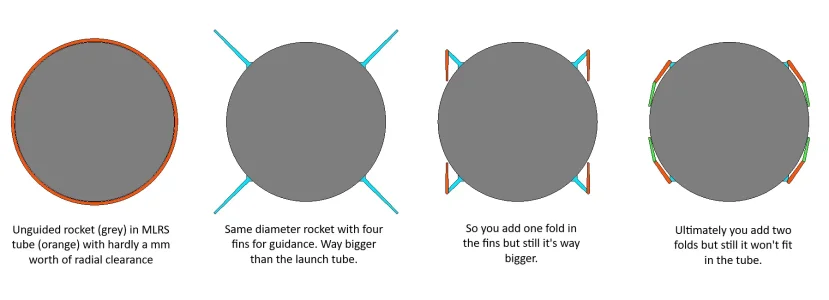
So to get around this people mount these fins in the nose cone as the diameter is smaller, so that it doesn't interfere with the tube. It's more or less the norm. GMLRS, Pinaka, Extra...all of them
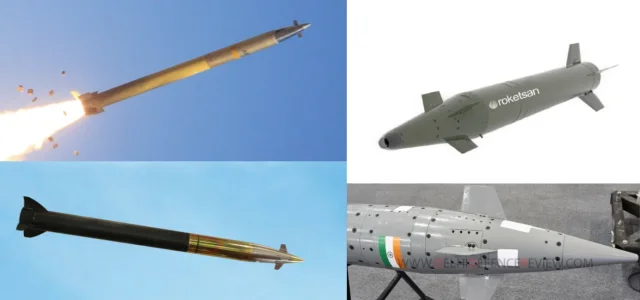
Maybe what they're trying to do here in BRE8 might be method to achieve this only by using a sub-caliber front section to accommodate the fins in existing tubes.
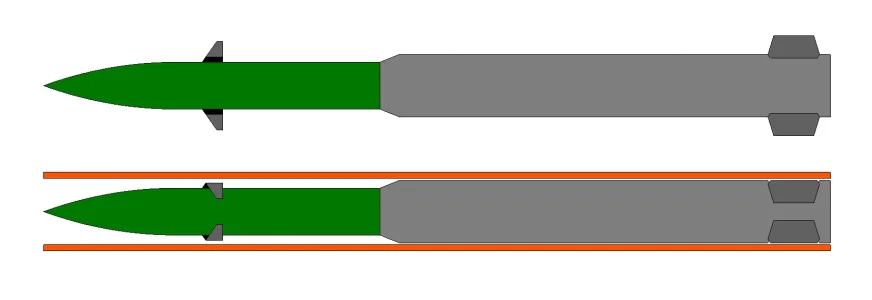
This would be my most probable guess.
Except for few pics from absolutely weird angles, there isn't much in the public domain so it would be bit tough to thisWhile you are at it can you also mention the dimensions of the following missiles (I'd assume that length is similar to Smerch rocket at 7.6m, but happy to be corrected)
BRC 3
BRE 3 (FD 140A)
BRE 6 (FD 220)
BRE 8 (FD 280)
King Dragon 300
Fire Dragon 480
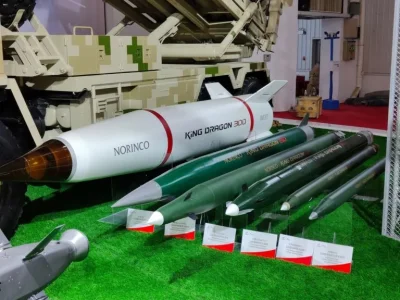
- Joined
- Jul 15, 2024
- Messages
- 240
- Likes
- 1,251
Although I agree that FD 280 being 2 stage is highly unlikely but if we go by what you say then why make the thin section so long (it's nearly 35% of the rockets length) if all the designers wanted was a way to fit in the fins then just make a small (say 500mm) section thinner instead of the current over 1.5m section.So what I think it might be is simply an arrangement to accommodate the front fins
Another thing that bothered me is that I saw no visible folding mechanism for the front fins unlike the Smerch
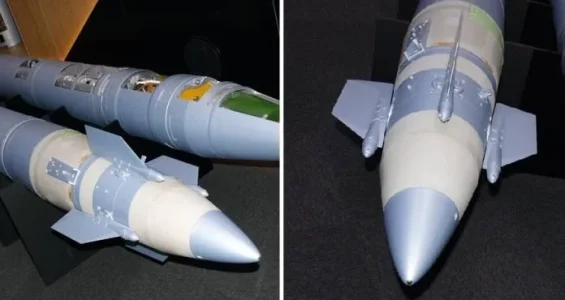
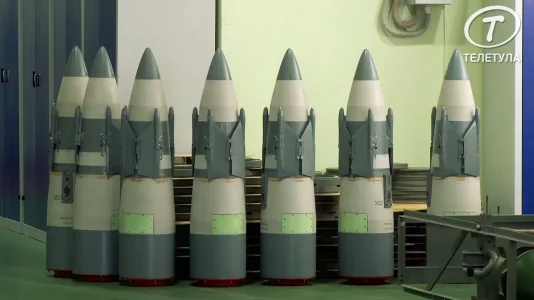
I believe We don't fold the front fins in pinaka and compensate for it by a 4 missile pod instead of the usual 6
Anyways here's a 300mm pod of PHL 16, if you have any luck with the dimensions of the missile with it do tell.
I tried and according to my rudimentary skills it's nearly 9.5 m long why I don't buy.
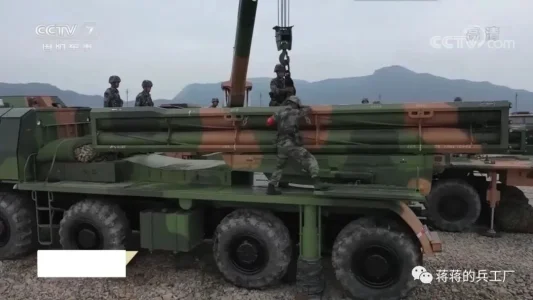
- Joined
- Jul 1, 2024
- Messages
- 4,723
- Likes
- 24,785

China Flashes "Anti-Hypersonic" Gigantic Radar That It Claims Can Detect & Track Every Kind Of Missile
Late last month, Chinese state media unveiled rare footage of an advanced long-range radar, reportedly capable of detecting missiles—including hypersonic ones—thousands of miles away. During Chinese President Xi Jinping’s Lunar New Year address to the military, the world caught a rare glimpse of...
 www.eurasiantimes.com
www.eurasiantimes.com
- Joined
- Jun 30, 2024
- Messages
- 1,800
- Likes
- 11,573
Users who are viewing this thread
Total: 2 (members: 0, guests: 2)

Latest Replies
-
Operation Sindoor & Aftermath
- username unkown
-
Failed Terrorist Beggar State of Pakistan: Idiotic Musings
- eastern_bhartiya
-
Indian Air Force: News & Discussions
- FalconSlayers
-
Indian Education System And Academia
- eastern_bhartiya
-
Russian Armed Forces
- Soldier35
-
Indian Military Activities in Space
- FalconSlayers
-
Defence Space Agency ( DSA) : News & Updates.
- FalconSlayers
Trending Threads













